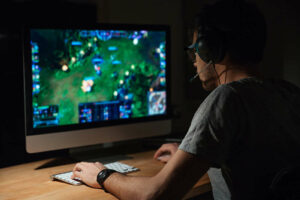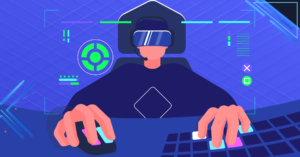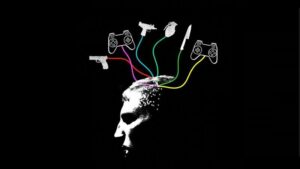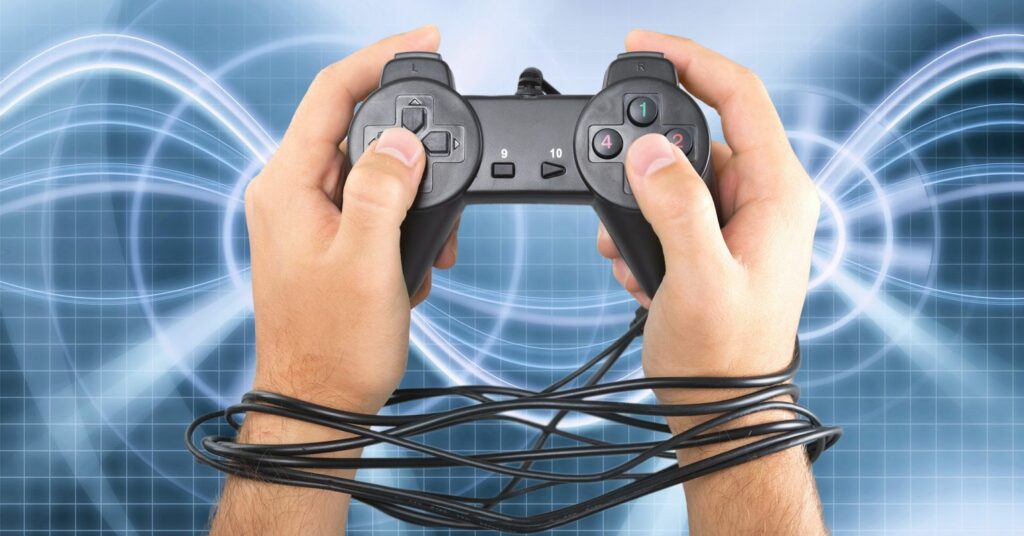Do you find yourself playing video games for hours on end? Do you feel like you can’t stop, no matter how much you may want to? If so, you may be suffering from a new kind of gaming disorder: OCD in gamers. This condition is characterized by an obsessive need to play video games and an inability to control your behavior. If you think that you or someone you know may be affected by this condition, please read on for more information.
Contents
Defining OCD Gaming Disorder

OCD gaming disorder is a new condition that is not yet recognized by the American Psychiatric Association. However, it is becoming increasingly common, especially among young people. This condition is characterized by an obsessive need to play video games and an inability to control your behavior. As we know that OCD is characterized by obsessions and compulsions, it is not surprising that this new disorder would be associated with gaming. It is different from other categories of OCD as it is not focused on a specific object or activity. Rather, it is the act of playing video games that becomes the obsession.
For some people with OCD gaming disorder, their compulsion may be to play a certain game for hours on end. Others may feel the need to collect every virtual item in a game or to achieve a high score. Some people may even spend real money on in-game items, even if they can’t afford it. No matter what the obsession is, people with OCD gaming disorder cannot control their behavior and often end up spending more time and energy on gaming than they would like.
Signs
The symptoms of OCD gaming disorder are similar to those of other types of OCD. People with this condition may:
- Spend excessive amounts of time playing video games (often more than 30 hours per week)
- Neglect important activities, such as schoolwork, work, or spending time with family and friends, in order to play video games
- Recognizing the need to cut back on their gaming, but being unable to do so
- Have difficulty stopping or reducing their gaming behavior, despite negative consequences
- Continue to play despite problems with their physical health (e.g., carpal tunnel syndrome) or mental health (e.g., anxiety, depression)
- Feel restless, irritable, or moody when they are unable to play
- Lie about how much time they spend playing
If you or someone you know is displaying these symptoms, it is important to seek professional help. OCD gaming disorder can be a very debilitating condition and it is important to get treatment as soon as possible.
Link Between The Two

Gaming disorder and OCD are more common than you might think. In fact, studies have shown that there is a strong link between the two conditions. Because of the similarity in symptoms, it is not surprising that there is a link between the two conditions. This link may lead to a vicious cycle in which people with gaming disorder develop OCD and people with OCD develop gaming disorder. We will now understand this connection in detail.
Does OCD Lead To Gaming Disorder?
Since the link is two-way, we will understand in detail how both the links exist in parallel.
- One study found that people with OCD were more likely to develop gaming disorder. The study found that people with OCD were three times more likely to develop gaming disorder than those without OCD.
- Since OCD is characterized by obsessions and compulsions, it is not surprising that this new disorder would be associated with gaming. It is different from other categories of OCD as it is not focused on a specific object or activity. Rather, it is the act of playing video games that becomes the obsession.
- Moreover, there is also a physiological link between the two conditions. Studies have shown that people with OCD have higher levels of dopamine, a neurotransmitter that is associated with pleasure and motivation. This may explain why people with OCD are more likely to become addicted to video games.
- Because OCD urges people to have repetitive compulsions to get rid of the obsessive thoughts, they may turn to video games as a way to escape their problems. Video games provide a distraction from the real world and allow people with OCD to focus on something else. However, this only provides temporary relief and can ultimately make the OCD worse.
Does Gaming Disorder Lead To OCD?
Now that we know the consequent relation between OCD to gaming disorder, we will also understand the reverse of it.
- A separate study found that people with gaming disorder were more likely to have OCD. In fact, the study found that nearly half of all people with gaming disorder also had OCD.
- Video games also contain many of the same elements that are found in OCD. For example, video games often require repetitive actions and have strict rules that must be followed. In addition, many video games contain virtual rewards that can be collected. These rewards may be similar to the compulsions that people with OCD engage in.
- Excessive indulgence in video games has damages on our brain structure. For example, it can lead to changes in the striatum, which is the part of the brain that is responsible for motivation and pleasure. These changes can then lead to OCD.
- Lastly, gaming disorder can also lead to social isolation. People with gaming disorder often withdraw from friends and family in order to spend more time playing video games. This isolation can then lead to OCD as people become more obsessed with their virtual world.
There is a thin line between gaming and having a disorder. It is essential to be on the lookout for the signs and symptoms of both conditions. If you or someone you know is displaying these symptoms, it is important to seek professional help.
Consequences
It is no secret that two such disorders can have disastrous consequences. Gaming disorder and OCD can both be very debilitating conditions. If left untreated, they can lead to drastic and life-threatening consequences. Some of the consequences include:

- Social isolation: This is the first and foremost consequence. It is one of the main reasons why these disorders are so damaging. As mentioned earlier, people with gaming disorder and OCD often withdraw from friends and family. This can manifest as not wanting to leave the house, not wanting to go to school or work, and not wanting to engage in any social activities.
- Academic or professional loss: This is another common consequence. Because these disorders can be so debilitating, people often cannot maintain a job or be active in school. They may call in sick often, miss deadlines, or be unable to focus on their work/studies.
- Financial problems: As mentioned earlier, people with gaming disorder and OCD often spend a lot of money on their activities. This can lead to financial problems, such as debt and bankruptcy. Some people may also indulge in betting over the Internet, which can lead to even more financial problems.
- Increased vulnerability to mental disorders: It is no secret that mental disorders often go hand-in-hand. Having one mental disorder can make a person more susceptible to developing others. This is especially true for gaming disorders. An individual with a gaming disorder OCD is more likely to develop depression, anxiety, insomnia, mood swings, and other such disorders.
- Physical side effects: An obvious side effect of video game addiction is the depletion of physical health. Spending an excessive amount of time sitting in one position can lead to weight gain, headaches, neck pain, carpal tunnel, unhealthy weight gain, and a whole host of other physical problems. In addition, people with gaming disorder often forego basic needs, such as food and sleep, in order to spend more time playing video games. This can lead to a poor sense of hygiene and self-care.
- Online safety threats: This is an unusual yet very common consequence of gaming disorder and OCD. Because people with these disorders often spend a lot of time online, they are at an increased risk for cyberbullying, doxing, identity theft, and other such threats. They may also be more likely to engage in risky behaviors, such as giving out personal information or meeting strangers in real life.
- Suicidal thoughts or actions: Lastly, this is the most serious consequence of gaming disorder and OCD. People with these disorders often feel hopeless and helpless. They may see no way out of their situation and may turn to suicide as a way to escape. They may also harm themselves as a way to cope with their feelings of inflicting pain to punish themselves.
As you can see, the consequences of gaming disorder and OCD can be very serious. If you or someone you know is struggling with either of these disorders, it is important to seek professional help. There are many resources available to people who are struggling with mental health conditions. With timely and helpful treatment, it is possible to manage these disorders and live a happy and fulfilling life.
Tips To Deal
Fortunately, there are some things that can be done to help ease the symptoms of gaming disorder and OCD. This help can be through the assistance of a mental health professional, or by adopting self-help strategies. Either way, it is important to remember that help is available and these disorders can be managed.
Professional Help

Seeking aid from a mental health professional is the first step to managing gaming disorder or OCD. A therapist can help you understand your condition and work with you to develop a treatment plan. This plan may include medications, therapy, or a combination of both. In extreme cases, hospitalization or rehabilitation may be necessary. Some of the most common interventions include:
- Cognitive-behavioral therapy: This type of therapy helps people with OCD by teaching them how to change their thinking patterns and behaviors.
- Exposure and response prevention therapy: This type of therapy involves gradually exposing a person to the things that trigger their OCD symptoms. They are then taught how to control their reactions to these triggers.
- Acceptance and commitment therapy: This type of therapy focuses on helping people with OCD accept that their thoughts and behaviors are out of their control. It also helps them to commit to making changes in their lives despite these challenges.
- Expressive therapy: This type of therapy uses art, music, or writing to help people with OCD express their feelings and thoughts.
- Medication: In some cases, medication may be necessary to help manage the symptoms of OCD. The most common type of medication used to treat OCD is selective serotonin reuptake inhibitors (SSRIs). These medications work by increasing the levels of serotonin in the brain. Some other medications may also include:
-Serotonin and norepinephrine reuptake inhibitors (SNRIs)
-Tricyclic antidepressants
-Monoamine oxidase inhibitors
-Anti-psychotic medication
-Sleep medication
- Hospitalization: In severe cases, people with OCD may need to be hospitalized. This is the last resort for treatment and is usually only necessary if a person is a danger to themselves or others.
- Rehabilitation: After hospitalization, some people with OCD may need to go to rehabilitation. This helps them adjust to living with their disorder and provides them with the tools they need to manage their symptoms.
It is important to work closely with a licensed and qualified mental health professional to develop a treatment plan that is right for you. Not all of these interventions will be necessary, and some may not work for you. It is important to find what works best for you and to stick with it.
Self-Help
There are also some things that you can do on your own to ease the symptoms of gaming disorder and OCD. Some self-help strategies that may be helpful include:

- Educate yourself about your disorder: Learning about your disorder can help you to understand it better and give you a sense of control.
- Set limits: Setting limits on your gaming or other activities can help you to control your disorder. It also helps to set aside time for other activities that you enjoy.
- Stick to a routine: Having a set daily routine can help to ease the symptoms of OCD. This routine should include time for gaming, but also time for other activities such as school, work, or spending time with friends and family.
- Find a support group: Connecting with others who are struggling with the same thing can be helpful. It can provide you with a sense of community and understanding.
- Keep a journal: Writing down your thoughts and feelings can help you to identify your triggers and cope with your symptoms.
- Find alternate outlets: Participating in other activities that you enjoy can help to take your mind off of your disorder. Some good options include sports, hobbies, or spending time outdoors.
- Indulge in mindfulness: Mindfulness is a type of meditation that can help you to focus on the present moment and accept your thoughts and feelings. This can contribute to a sense of calm and peace
- Practice relaxation techniques: Relaxation techniques such as yoga, meditation, or deep breathing can help to reduce stress and ease anxiety.
- Get enough sleep: Getting enough rest is important for managing any mental health condition. Make sure to get at least eight hours of sleep each night.
These tips are just a few examples of things that you can do to ease the symptoms of your disorder. It is important to find what works best for you and to stick with it. Remember, you are not alone in this. There are people who care about you and want to help you get better. Seek out their support and guidance when needed.
Conclusion
In conclusion, OCD gaming disorder is a real and serious condition that can be debilitating for those who suffer from it. However, with the right treatment, it is possible to manage the symptoms and live a happy and healthy life. If you or someone you know is struggling with OCD gaming disorder, don’t hesitate to reach out for help. There are people who care about you and want to see you get better.
Please note that this blog post is only for informational purposes and is not a substitute for professional treatment. If you are looking for OCD treatment, please contact Therapy Mantra. We have a team of highly qualified mental health professionals who can help you develop a treatment plan that is right for you. Our services are affordable and effective and available to people all across the world. Do visit our website to book a session or download our free OCD treatment app on Android or iOS for more information.


